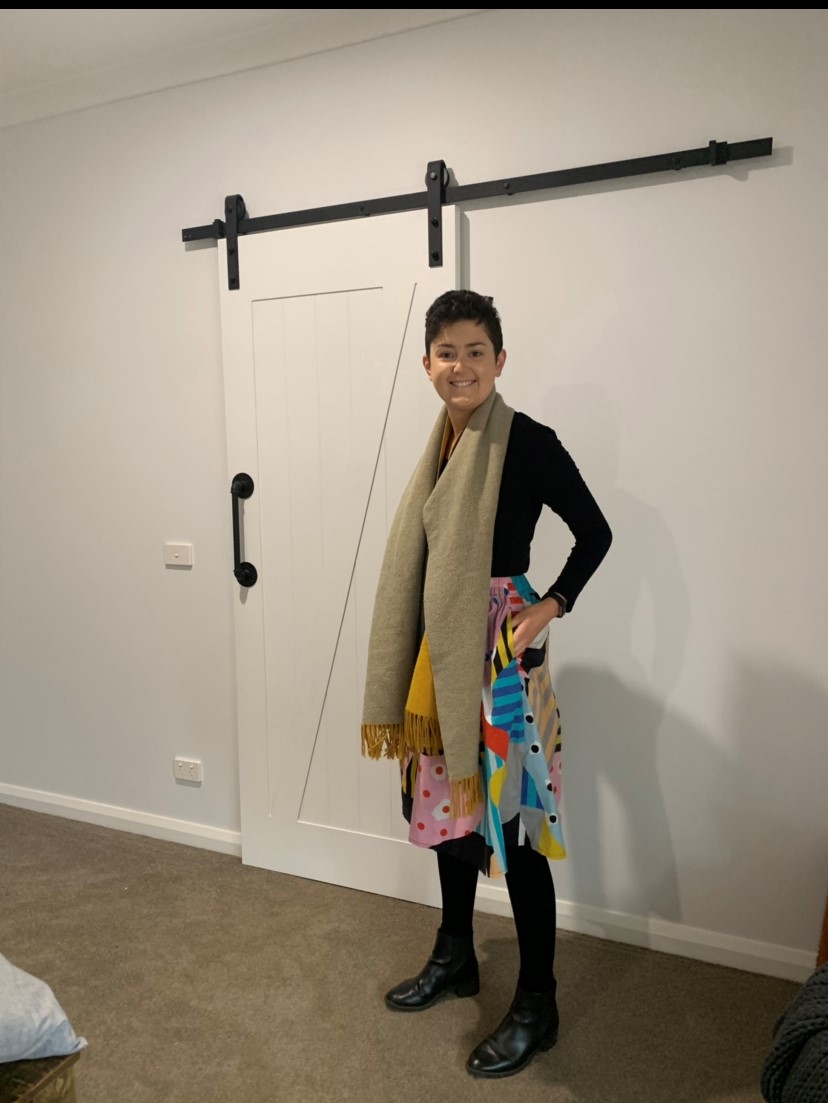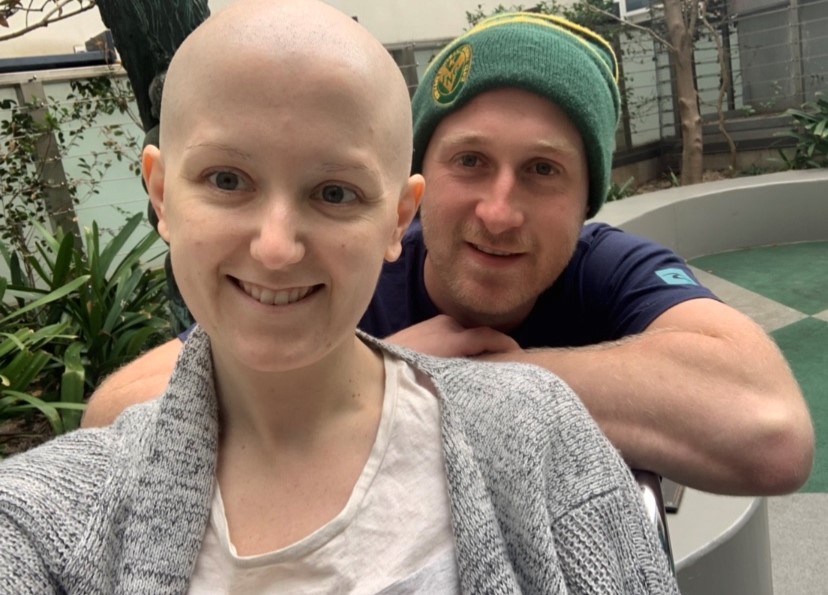By Rebecca Hurst
Rebecca Hurst was diagnosed with Stage IV ovarian cancer at the age of 25. She endured multiple surgeries and rounds of chemotherapy but unfortunately passed away in November 2020.
Rebecca's determination to advocate and raise awareness by sharing her story was a true inspiration to everyone she met. We hope the words shared in her blog articles will serve as a powerful insight for those of you seeking information and perspective.
The OCRF is committed to honouring the Rebecca's memory, and the memory of every woman whose lives were taken too soon by this silent disease.

Anniversaries are often linked to signs of celebrations. It might be a relationship milestone (hi to all you “happy one month-ers" out there), number of years in a workplace, a friendship that has stood the test of time or even how long we have been in COVID isolation. July 31st 2019 will always mark a different kind of occasion for me, and as the anniversary comes around I have grappled with how to mark the occasion.
On July 31st 2019, I spent over 8 hours with my surgery team, having the biggest surgery I would ever have to try and save my life. It was called a "debulking surgery", where they would attempt to remove as much cancerous growth at possible. Rather than have a Zoom party (there isn’t really a ring to ‘ain’t no party like a debulking party’), I have chosen to mark the occasion by writing about it. I hope to raise awareness and shine the light on surgery as one of the lesser spoken about treatment routes for ovarian cancer, as well as the resulting challenges I now face every day.
before surgery
Before we dive right in, a quick bit of background information about me and my journey with ovarian cancer.
In April 2019 at just 25 years old, I was diagnosed with ovarian cancer. My treatment plan involved doing three rounds of chemotherapy to try and shrink the brick sized tumour growing off one of my ovaries, and then a review scan to see if it has been successful.
I thought I was in good stead for a positive outcome due to:
- my age: young
- level of fitness: med-high
- ability to manage side effects: very good
- between rounds: feeling fairly normal
- ascites (fluid/bloating): hadn’t returned
- CA125 blood tests: levelled out (weren’t increasing)
Unfortunately this wasn’t the case, and my brick sized tumour was still a brick sized tumour when I presented for my surgery on 31st July 2019.
I had two weeks after my last chemo to prepare for the biggest surgery of my life, which could involve: debulking (to remove as much cancer as they could), total hysterectomy, oophorectomy (removal of both ovaries), removal of my peritoneum (or omentum—always get them confused) and part of my bowel. Removal of my bowel also meant there was a 10% chance I would need a temporary ileostomy to aid my recovery.
There were lots of + and - on my consent form, because they wouldn’t be sure of what they needed to do until I was open on the table. I learned that sitting up, getting out of bed and walking even just a few steps was going to be difficult.
I was not allowed to cook. I knew that I would be unable to drive for 6-8 weeks. I would have a very large scar down the middle of my abdomen. I was going to be in pain. Most of all I felt I was walking into a big unknown.
I was given some general tips on how to best prepare for the surgery, mainly keeping up exercise and cardiovascular fitness as a priority. But I couldn’t shake the feeling of being totally out of control. I had followed all of the ‘rules’ given to me with chemotherapy and it hadn’t worked. It felt overwhelmingly like everything was coming down to chance.
In amongst all of this, I do consider myself lucky that my fertility was something that was always discussed openly and honestly with my treating team, and that it is something that was at the forefront of their minds.
Losing my ability to have children of my own is one of the toughest things I have ever had to come to terms with, and am still coming to terms with today.
My team explained that there was a very slim chance I would have some egg tissue to salvage, so it was organised that there would be someone at the surgery ready to take it, just in case. This chance was so slim and seemed so far-fetched that I didn’t mentally allow myself to count it. In fact, my partner and I had already began discussions about other pathways to parenthood through the hospital, but we were both grateful the option to salvage tissue was there just the same.
 Rebecca with her partner, Ryan, recovering days after her debulking surgery.
Rebecca with her partner, Ryan, recovering days after her debulking surgery.
The road to recovery
The surgery lasted over 8 hours and was considered largely a success. I was told they were able to remove 95% of the tumour and what was left was tiny “salt and pepper flakes” too small to remove scattered throughout my abdomen. Unfortunately the bowel portion of the surgery was more extensive than initially planned and I was let with a (supposedly) temporary ileostomy. This was absolutely devastating to me at the time, with only a 10% chance I would wake up with one, I hadn’t processed what that would mean. I cried and cried—just another life changing thing I would need to learn to live with.
Due to some pesky complications, the 48 hours directly after my surgery would prove to be the most painful and challenging. All signs were pointing to that I was having a heart attack. My epidural had to be reversed, and I was on minimal pain relief while the team checked for heart damage via an angiogram and ultrasound. Luckily in the end my heart was fine, but I was in a world of pain.
Over the next 8 days in hospital I would slowly regain my ability to move, sit up, stand, walk and use the bathroom. I was reliant on those around me like I had never been before and this was a significant adjustment for me. The team was very clear that pushing my body to do things too quickly was going to do more harm than good, and I knew the next two months were going to be a balancing act.
where to from here?
The last 12 months has seen the return of my cancer, resulting in more procedures and periods of recovery. One thing I have learned to accept is that my body isn’t in the same position that it was 12 months ago. With each procedure, the period of recovery increases both physically and mentally.
It has been important to shine the light on surgery as a cancer treatment, because often there is such a focus on chemotherapy it feels almost forgotten. In my case, and in the case of many people who have undergone surgery, I carry the effects with me every day. Sure, some days are much easier than others, though those are becoming few and far between as the disease progresses. You could almost say I forget about what my body has been through. But it’s not that, you never forget—it’s adjusting to a ‘new normal’ to live by, a new set of rules which determines if you have a good day or bad. The scars left by surgery are certainly more than just skin deep but it helps to take things one step at a time.
Learn more about how the OCRF is funding research into more personalised and effective treatments for ovarian cancer patients.